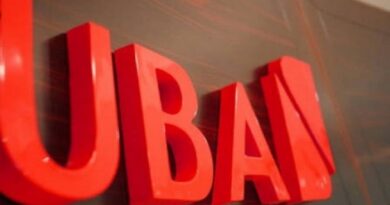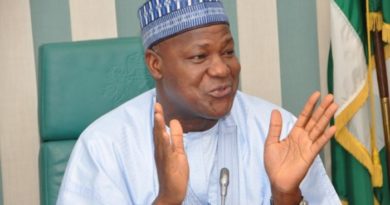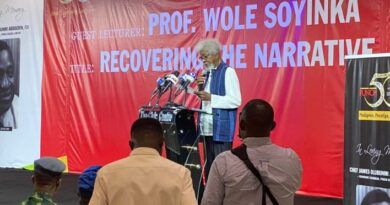Again, Peter Obi beats Tinubu, Atiku in ANAP’s new opinion poll
Presidential candidate of the Labour Party (LP), Peter Obi, has again, polled a lead over his counterparts in the two major political parties in Nigeria, the Peoples Democratic Party (PDP) and the ruling All Progressives Congress (APC), in the latest opinion poll conducted by Anap Foundation.
Ahead of the February 25 Presidential election in Nigeria, a new opinion poll commissioned by ANAP Foundation shows Peter Obi, Presidential candidate of the Labour Party (LP), holding a significant lead over Bola Ahmed Tinubu, of the ruling All Progressives Congress (APC) and Atiku Abubakar, of the opposition Peoples Democratic Party (PDP), as well as Rabiu Kwankwaso, of the New Nigeria Peoples Party (NNPP).
ANAP Foundation has traditionally organised political opinion polls ahead of each of the presidential elections since 2011 and are conducted by front-line polling company, NOI polls.
The first two polls, which were conducted in 2022 had predicted Obi as the likely winner of the presidential election
In a statement on Wednesday, ANAP’s founder, Atedo Peterside, said the latest poll was concluded in the first half of February 2023, using the same methodology of earlier polls.
Touting the transparency of the poll, Peterside said the methodology used by NOIPolls is the same methodology that was used in previous Presidential Polls in 2011, 2015 and 2019 respectively, to predict the elections whose results were as predicted.
As opposed to the two previous polls, he said the sample size for the third poll was increased to 2,000, which revealed that “Obi leads with 21% of registered voters proposing to vote for him if the presidential election were to be conducted today, and 13% proposing to vote for Bola Tinubu, who fell in second place.
“Atiku Abubakar was third with 10% and Rabiu Kwankwaso was a distant fourth with 3% of voters proposing to vote for him,” the statement said.
The Foundation explained that Obi’s 8%-point lead at this stage of the election is significant, but not sufficient to separate him from a leading pack of candidates scoring 13%, 10% and 3% with undecided voters at 23% and refused voters put at 30%.
“Undecided voters and those who prefer not to reveal their preferred candidate add up to a whopping 23% and 30% respectively. The gender split of undecided voters shows that 27% of women are undecided versus 18% of male registered voters,” the statement added.
Zone-by-zone scores by each candidate show that Obi got 24% in the North Central, 6% in the North East, North West 8%, South East, 53% South South 38% and South West 14%, respectively.
Tinubu, who was polled to likely emerge as runner-up with 13% scored 16% in the North Central, 16% in the North East, North West 20%, South East, 1% South South 3% and South West 14% respectively.
The poll showed Atiku emerged as second runner-up with 10% scoring 4% in the North Central, 17% in the North East, North West 20%, South East, 3% South South 5% and South West 3% respectively.
“In comparison to previous polls, the percentage of undecided and refused voters increased significantly from 38% in 2019 to 53% as at the time of this poll showing that a host of voters are either still seated on the fence, barely 14 days to the general elections or are refusing to disclose their preferences.
“Our agreed methodology does NOT allow NOIPolls staff to attempt to cajole unresponsive voters into making a choice on the phone because we believe that violates the rights of a voter.
“When asked if religion would affect the choice of respondents, data gathered voluntarily showed that 9% of the respondents replied in the affirmative to religion influencing their choice of candidates but 87% on the other hand, responded that their choices were not being influenced by religion; in the same vein, 7% responded in the affirmative to ethnicity affecting their choice of candidates while 89% responded that their choices were not influenced by ethnicity,” the statement pointed out.
The foundation explained that the top five reasons why voters are more inclined to vote in the forthcoming elections are the need to tackle insecurity (36%), Inflation (26%), Unemployment (11%), Poverty alleviation (6%) and Education (5%).
It noted that “81% of those aged 18-25, 83% of those aged 26-35, 85% of those aged 36-45, 89% of those aged 46-60 and 81% of those aged 61+ responded that they would definitely vote in the coming elections.”
The poll further indicated that age groups that expressed the greatest willingness to vote were those between 36-45 and 46-60 years, while “almost 9 in 10 registered voters say that they are absolutely certain that they would be voting in the 2023 presidential election as compared to 8 in 10 registered voters in 2019.
“If they stay committed over the course of the next fortnight and in the absence of aggravated security concerns or unresolved PVC collection challenges, we could witness a huge turnout in the February 2023 Presidential elections.
“While this Poll result shows some very significant trends, it is key to note that the eventual outcome lies in the hands of the voters, who are Undecided and/or Refused to disclose the identity of their preferred candidate, as they could ultimately decide which candidate takes the overall lead to emerge as the President of the Federal Republic of Nigeria in the 2023 Presidential elections,” the statement added.
According to the Poll, the South West accounted for the highest number of voters, who refused to disclose their preferred candidate with 38% while other zones ranged from 18-36%.
The statement further explained that “At 38%, the South West figure is an outlier. Historically, an exceedingly high percentage of voters refusing to disclose their preferred candidate has usually been associated with perceptions/fears (real or imagined) of possible voter intimidation within a geographical area.
“Other possibilities abound e.g. voters not wanting to reveal that they appear to be voting on the basis of ethnicity and/or religion, or voters not being comfortable disclosing on the phone that they wish to vote for a candidate other than the one from their own ethnic and/or religious grouping.
“We are also aware of the pressures that come from voters seeking to appear trendy and multiple other factors at play.
“Our conclusion is that, using our tried and tested method of sampling since 2011, the 2023 Presidential Elections are too close to call, notwithstanding the fact that whoever was at the top of the polls based on this exact same methodology in 2011, 2015 and 2019 eventually won the elections.
“This time, Peter Obi has been the front-runner throughout, but we caution that the Undecided/Refused vote is still too high (in early February 2023) to be ignored. We had thought that by delaying our 3rd and Final Poll until early February 2023, we would see a collapse of the Undecided Vote.
“The reality is that the reduction in the Undecided Vote has been more than offset by the increase in the number of voters who refuse to disclose the name of their preferred candidate.
“When we carried out our first and baseline poll in September 2022, we thought a long campaign period would lead to different candidates taking turns to lead the field. That has not been the case. This long-drawn-out race has been surprisingly stagnant.”




